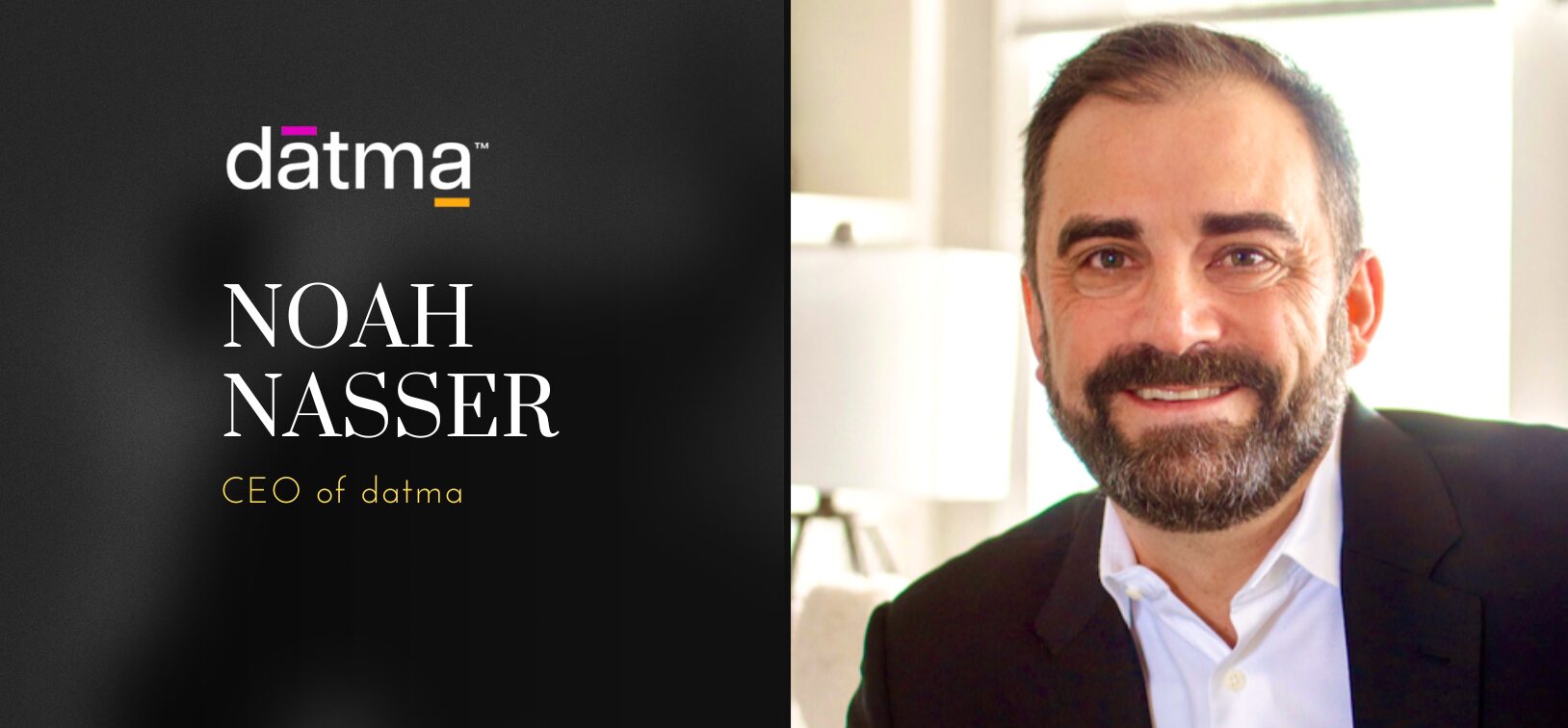datma, a healthcare technology company, is on a mission to change how vast amounts of molecular lab data are used for research, innovation, and to improve patient outcomes. In this exclusive TechBullion interview, Noah Nasser, CEO of datma, discusses how the company’s federated real-world data platform, datma.FED, is bridging the gap between molecular labs, health systems, and pharmaceutical companies.
Nasser explains how datma.FED enables labs to monetize their de-identified data securely, helping offset the costs of non-reimbursed tests while ensuring compliance with privacy regulations like HIPAA and GDPR. By providing high-quality, structured datasets, datma empowers pharma companies with actionable insights for evidence generation, market access strategies, and regulatory approvals.
With datma’s federated model, data never leaves the custodian’s infrastructure, instead, query-based insights are securely shared, overcoming traditional barriers like privacy concerns, regulatory compliance, and fragmented data. This approach enhances collaboration, accelerates precision medicine, and ultimately drives better healthcare outcomes.
Looking ahead, Nasser shares how datma is scaling globally, investing in AI-driven analytics, and launching new solutions like datma.WHY and datma.360 to push the boundaries of real-world evidence generation and personalized medicine. As the future of healthcare becomes increasingly data-driven, datma is leading the charge in unlocking the true value of molecular lab data.
Please tell us more about yourself.
My name is Noah Nasser, and I’m the CEO of datma. I’ve spent my career at the intersection of healthcare, technology, and data, with a focus on building innovative solutions that address critical challenges in the industry. Prior to joining datma, I’ve held leadership roles at several healthcare companies, focusing on advancing precision medicine and optimizing healthcare data for real-world impact. At datma, I’m driven by our mission to empower healthcare organizations by unlocking the potential of real-world data, fostering collaboration, and enabling both health systems/labs and pharmaceutical companies to derive meaningful insights from healthcare data.
What is datma, what inspired this business, and what problems are you solving?
datma is healthcare technology company focussed on a federated real-world data platform bridging the gap between data custodians (molecular labs and health systems) and data consumers ( pharmaceutical companies). Our goal is to harness the unrealized potential of healthcare data by enabling health systems and labs to monetize their data securely while providing pharma companies with high-quality, fit-for-purpose datasets for evidence generation, market access, and advanced analytics.
The inspiration for datma came from recognizing the immense untapped value in healthcare data. Labs generate critical insights through routine clinical services, but this data is rarely leveraged to its full potential. At the same time, pharma companies face challenges with incomplete, fragmented, or inconsistent datasets that require significant time and resources to structure and analyze. datma bridges this gap, creating a secure, compliant ecosystem where both data custodians and data consumers can thrive.
The healthcare and pharma industries generate massive amounts of molecular lab data, yet much of it remains untapped. How does datma.FED help labs unlock and leverage this data to create new opportunities?
datma.FED is designed to transform underutilized healthcare data into actionable insights while ensuring data custodians maintain full control over their data. Through our federated model, health systems and labs can generate new revenue streams and help offset the costs of non-reimbursed tests by making their de-identified datasets queryable within a secure, privacy-first environment.
For pharma companies, datma.FED delivers multimodal, high-resolution, research-ready datasets that go beyond traditional claims or EHR data. This enables them to answer targeted research questions, map patient journeys, refine market access strategies, and generate evidence to support regulatory submissions, payer decisions, and clinical adoption. By facilitating a compliant and low-burden data-sharing ecosystem, datma creates a win-win scenario, where both data custodians and data consumers derive value while advancing healthcare innovation.
Historically, labs and pharma companies have operated in silos. What challenges have prevented seamless collaboration, and how does datma’s federated model change the landscape?
Several barriers have traditionally hindered collaboration between data custodians, and data consumers, including privacy concerns, regulatory compliance requirements, resource-intensive data preparation, and the complexity of harmonizing disparate datasets. Many data custodians are protective of their data, and rightfully so, as they must ensure compliance with strict privacy regulations like HIPAA and GDPR. Additionally, the process of sharing data has traditionally been resource-intensive, requiring significant time and effort to prepare datasets.
datma’s federated model changes this by allowing data custodians to retain full control of their data. With datma.FED, data never leaves the lab’s infrastructure. Instead, insights are securely shared in a compliant manner, eliminating the need for direct data transfer. The platform automates data harmonization and standardization, reducing the operational burden and ensuring data is research-ready. Additionally, datma manages the entire onboarding and execution process—including investigator recruitment and regulatory compliance supports—ensuringseamles, low-burden collaboration process.
Pharma companies face significant hurdles with incomplete or inconsistent datasets. How does datma ensure that the real-world data labs provide is accurate, actionable, and valuable for evidence generation and analytics?
datma.FED is designed to provide high-resolution, research-ready datasets that are fit for evidence generation, market access, and clinical applications. Rather than offering broad, static datasets that require extensive preparation, datma ensures that all data is harmonized, structured, and immediately usable. By handling extraction, standardization, and quality checks at the point of ingestion, datma provides pharma with clean, query-ready data that eliminates the need for manual preparation.
Additionally, datma offers longitudinal, multimodal patient-level insights, enabling pharma companies to answer specific, high-impact research questions. Whether it’s mapping patient journeys, analyzing treatment pathways, or generating evidence for regulatory submissions, datma ensures the data is actionable and tailored to each specific need. .
Many labs struggle with the financial burden of non-reimbursed tests. Can you explain how datma.FED enables labs to securely monetize their data while maintaining compliance with industry regulations?
Non-reimbursed tests are a significant financial challenge for many labs, yet the data they generate holds significant value for pharmaceutical companies. datma.FED provides a secure and compliant way for labs and health systems to monetize this data while maintaining full control. Unlike traditional models, our federated approach allows data custodians to share de-identified insights through controlled, query-based access without data ever leaving their environment.
This ensures compliance with HIPAA and other regulatory standards while also enabling data custodians to help offset operational costs and reinvest in innovation. By participating in collaborations, labs and health systems can not only create new revenue streams, but also contribute to advancing precision medicine and treatment innovation.
Given strict data privacy regulations like HIPAA and GDPR, how does datma.FED ensure secure and compliant data sharing between labs and pharma companies?
Compliance and security are at the core of datma.FED. Our federated model eliminates the need for direct data transfers, ensuring that data remains within the lab’s infrastructure while approved insights are shared with pharma companies.
We enforce strict access controls, robust encryption , and audit trails to ensure data privacy and security. Our cell-size restriction and governance framework further mitigate re-identification risks, ensuring only aggregated, privacy-preserved insights are shared.
Further, datma.FED directly address issues around data attribution and stewardship with with a suite of supply side parameters that place these parameters firmly in the hands of the data custodian. Custodians can control with nearly line item detail what is shared and under what circumstances. Not only does this addresses issues with PHI, but also with data governance.
Access to high-quality molecular data can significantly impact regulatory approvals and payer decisions. Can you share an example of how datma has helped accelerate a pharma company’s go-to-market strategy?
In partnership with a major pharmaceutical partner, we successfully addressed the challenges with low uptake of a precision therapeutic. By utilizing our federated data solution and advanced analytics, we identified key barriers, including low molecular testing adoption and limited physician awareness. This valuable insight empowered the pharmaceutical company to take targeted action to address these challenges and improve the success of their therapeutic. These insights and data were not available through other means.
As AI, machine learning, and data-driven healthcare advance, where do you see datma’s role in shaping the future of lab data monetization and real-world evidence generation?
datma is at the forefront of transforming how lab data is utilized in healthcare. As AI and machine learning continue to evolve, the demand for high-quality, structured datasets that enable precise, large-scale analyses will only grow. datma.FED is uniquely positioned to enable pharma to conduct targeted evidence generation studies for regulatory approvals, payer engagement, clinical guideline inclusion, physician adoption, while also supporting market access strategies through patient journey mapping and treatment optimization.
By integrating multimodal data into a privacy-first, query-ready environment, we remove barriers to data access and accelerate insights that improve commercialization and clinical adoption. By continuing to innovate and expand our platform, we aim to be a leader in the future of real-world evidence generation and lab data monetization.
As datma continues to grow, what’s next on the horizon? Are there new partnerships, technological advancements, or industry trends that excite you for the future?
datma is poised to revolutionize healthcare. We’re scaling our federated data network exponentially, forging strategic partnerships with leading health systems, labs, and pharmaceutical innovators. This expansion, coupled with our deep investment in AI-driven analytics, will unlock unprecedented insights from real-world data.
Building upon our strong foundation in US precision oncology, we’re rapidly evolving into a global force. Within five years, datma will be synonymous with secure, high-quality data driving personalized medicine and efficient care delivery. Our datma.FED platform is the cornerstone of this vision, empowering researchers with comprehensive, multi-modal datasets.
Imagine a future where clinicians leverage AI seamlessly, delivering precise, timely care while minimizing administrative burdens. This is the future datma is building. Our federated model ensures data custodians maintain control, while enabling breakthroughs in disease detection and treatment.
Through the expansion of our network and the launch of transformative tools like datma.WHY and datma.360, we will enable earlier diagnoses, more effective therapies, and dramatically improved patient outcomes worldwide. datma is not just participating in the future of healthcare; we’re defining it.































